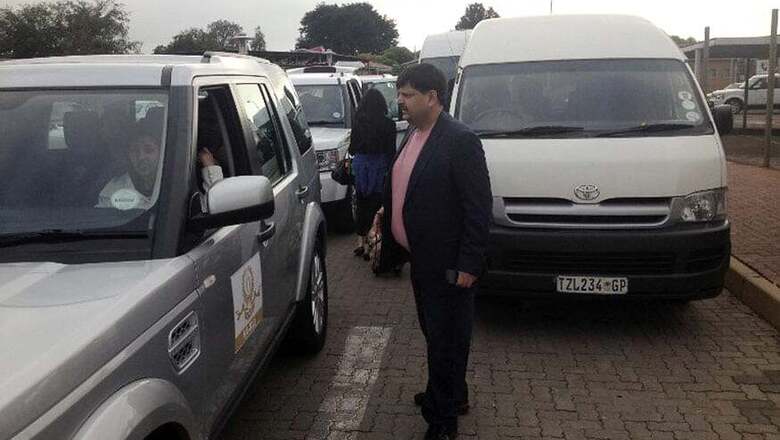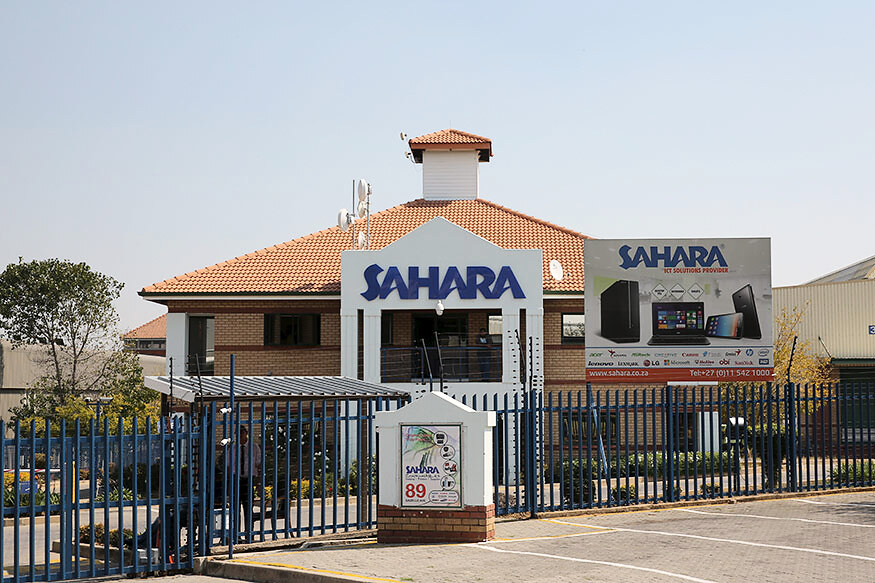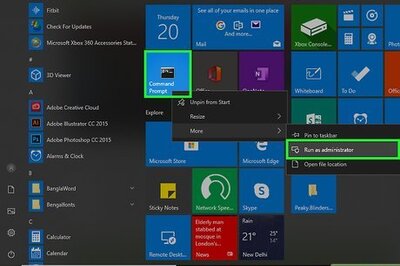
views
The three brothers from Saharanpur have been accused of being “power brokers”, even running a “shadow government” in South Africa. But the Gupta Family now feels enough is enough and is exiting their business in the African nation. In this freewheeling interview with News18.com’s Joydeep Sen Gupta, one of the three brothers, Atul Gupta, defends the family against the allegations. He says the family is supportive of President Jacob Zuma’s determination to challenge powerful vested interests that have held back SA’s economic emancipation. “These efforts have resulted in a powerful reaction from these same forces who also control most of SA’s media,” he says.
Excerpts:
Q: Take us through your decision to come to South Africa way back in the 1990s. Has this been accurately reported? What did you think of the country when you first arrived?
Historically, many generations of our family have been traders and businessmen. Whilst our father was a very successful and respected businessman in his own right, he educated us from an early age on the importance of standing on our own feet and relying on our own resources to develop our own opportunities. There was never any question that we would just walk in and take over our father’s businesses. This is not the Gupta way. And the same is true for the next generation. Our children are developing their own business opportunities. We love business – it is in our blood – and our success is the product of our philosophy, discipline, energy, focus and hard work.
In the early 1990s we three brothers left India to explore new business opportunities overseas. Each of us went to a different region – Rajesh went to Asia /China, Ajay stayed in India and I came to Africa/South Africa. Our focus at the time was primarily, but not exclusively, in the technology sector. Each of us was relatively successful, finding niche opportunities that afforded healthy margins and ROIs. However, it was in South Africa that we soon discovered a market that was so dominated by monopolies and industry cartels that we were able to undercut the competition and still achieve margins much higher than anywhere else where we were operating. We quickly came to the conclusion that the rigid and uncompetitive structure of the SA market was the ideal environment for us to disrupt and exploit as entrepreneurs.
When our father passed away in 1994 we decided to close all our other businesses and to focus exclusively in South Africa. As we grew, we quickly encountered powerful vested interests, a small number of powerful families dominating key markets and business sectors, who used their influence and political connections to try to undermine our businesses. We persisted and grew and developed a strong and loyal management team and workforce. Over the years we saw many other investors and businesses try and fail to disrupt these same vested interests. We attribute our success to our persistence and perseverance.
SA is a young nation and a land of opportunity, but the ‘Rainbow Nation’ has not delivered for the majority of its people. SA must reform its economy and end the economic apartheid that has kept the majority of its citizens impoverished. We want our legacy, now that we are exiting our businesses, to encourage and support a new generation of black entrepreneurs who will become the catalyst for SA’s economic emancipation.
The sadness for us is not the personal abuse and hostility directed at us, but the fact that this potentially great country is being held back by those same vested interests that oppose economic emancipation.
Q: What were the breakthroughs that took your business to large scale? When would you say things really took off and why?
We came to SA with strong expertise in IT. It was a very lucrative area for us and the sector where we made our first breakthrough in SA. We were able to source components and price our products to undercut the competition and yet still make a healthy profit. We realised that we could apply the same business methodology to succeed in other sectors – which is what we did.

Q: How connected have your business endeavours here been to India over the years? In what ways have your Indian origins been helpful?
Our contacts in India are primarily family and culture. Our Indian origins have been very important to us and we are fully active members of the South African Indian community which is integrated into life in SA. Like almost all Indians living here, we regard India as the mother country but SA as our home. Our Indian culture gives us drive and resilience and our strong sense of family values, tolerance and respect have also been crucial in helping us to withstand the attacks we have suffered over the last few years.
Q: What made you decide to enter the mining industry, given its competitiveness and capital intensity?
The primary driver for our move into the mining sector was that we foresaw the trend in the IT sector towards lifestyle gadgets and knew we had to diversify. We then rightly identified that the mining sector was another closed and protected market that was ripe for disruption, and moved gradually into the sector. Firstly, with turn-key service provider JIC Mining Services in 2005, which we turned from a loss-making basket-case into a profitable, healthy business with more than 10,000 employees at its peak. We then took Shiva Uranium from an 80-employee mine in Care and Maintenance to a highly successful operation with more than 1,000 employees. Finally, in 2015 we saw a major opportunity to expand in the market when Glencore put its troubled Optimum mine up for sale, and save hundreds of jobs in the process. As the largest state-owned company in SA, Eskom was at the mercy of a small but powerful cartel of businesses controlling around 80% by volume of its annual purchases. This lack of competition in the sector has resulted in SA’s energy prices being unnecessarily high, which acts as a major brake on the country’s economic growth.
Q: How were you first introduced to South African political leaders like Thabo Mbeki and Jacob Zuma? How would you describe your past and current relationship?
First and foremost, it is important to underline that as a business group, only around 1% of our overall turnover historically came from Government contracts. The current 8.9% is an anomaly driven since 2015 by the purchase of the Optimum mine. Government contracts therefore clearly represent a secondary part of our operations.

In terms of our relationships with political figures, as prominent and successful South African businessmen running companies employing tens of thousands of people, we, of course, came into contact regularly with politicians through trade, industry and community events and networks as is normal practice both in South Africa and worldwide. This is where we first met President Zuma as well as a wide range of other political figures.
We are supportive of President Zuma’s determination to challenge the status quo and the powerful vested interests that have held back SA’s economic emancipation. These efforts have resulted in a powerful reaction from these same forces who also control most of SA’s media.
Q: Much of the South African press and political opposition has become very hostile to you over the last couple of years. Why do you think this is so? Do you feel you haven’t explained yourselves adequately? What will it take to change this situation?
If you see us as agents of disruption who are challenging the status quo, then you will perhaps find the answer to your question. We were successful in entering sectors that were very uncompetitive and that had changed little since the apartheid era. Perhaps the tipping point for these powerful people was our entry into the media sector when we launched The New Age and ANN7. This was seen as a direct challenge to their close control of SA’s media.
We do not feel bitterly towards those who have attacked us. Perhaps we would have done the same if we were in their shoes. They are businesses trying to hold on to their privileged status and dominant positions that many of them held during apartheid. Perhaps we have been too reluctant to defend ourselves publicly, but whilst the media continues to fixate on us the real problems and challenges that SA must urgently face if it is to avoid a crisis, primarily the alleviation of the desperate poverty of the vast majority of its people, remain largely ignored.
South Africa is on a journey. The ending of apartheid did not bring about the opportunities and benefits for the vast majority of the black people of South Africa. In the United States, the abolition of slavery did not improve a lot of most Black Americans. It took another 100 years to achieve civil rights. It is also a sad historical fact that slave owners were compensated after the abolition of slavery. Similarly, if you scratch the surface of South Africa’s recent history, you will find that many of today’s entrenched privileged commercial and financial positions were put in place just prior to the ending of apartheid.
So to answer the last part of your question –the only thing that will change this situation is real and sustainable economic emancipation in SA.
Q: Do you still feel South Africa as the best place for you to live and do business in the long term? If not, where else might you go?
To live - yes. To do business – well we must now leave that to the next generation of business leaders and entrepreneurs as we are in the process of exiting all our business interests in SA. We only hope that those who succeed us will be encouraged to continue the fight to disrupt the status quo, not be afraid to compete with the powerful vested interests, and help reform and emancipate the country.
We are and will remain citizens of this country which is our home - and we intend to stay here.
Q: What does the family think about displays of public opposition against the family including protests outside their home in Saxonwold (most recently by the Democratic Alliance)?
A healthy democracy is one where public demonstrations are part of a society’s discourse with itself. What is not healthy is the way that one family has been made scapegoats and become a football in others’ political and commercial games.
Why has this happened? If you see us as agents of disruption who are challenging the status quo, then it starts to make sense. We were successful in entering sectors that were very uncompetitive and that had changed little since the apartheid era. Perhaps the tipping point for these powerful people was our entry into the media sector when we launched The New Age and ANN7. This was seen as a direct challenge to their close control of SA’s media.
We do not feel bitterly towards those who have attacked us. Perhaps in their shoes, we would have done the same. They are businesses trying to hold on to their privileged status and dominant positions that many of them held during apartheid. Perhaps we have been too reluctant to defend ourselves publicly, but whilst the media continues to fixate on us the real problems and challenges that SA must urgently face if it is to avoid a crisis, primarily the alleviation of the desperate poverty of the vast majority of its people, remain largely ignored.
Q: What is the family’s response to allegations (including in the State Capture report) that their businesses have benefited from a close relationship with President Zuma and his son Duduzane who worked for the company?
We have been successful because we entered an uncompetitive economy 20 years ago and were able to undercut the competition in sclerotic industry sectors and still make a healthy margin. It is important to underline that as a group of businesses only around 1% of our overall turnover historically came from Government contracts, with the current 8.9% an anomaly driven since 2015 by the purchase of the Optimum mine. Government contracts therefore clearly represent a secondary part of our operations.
In terms of our relationships with political figures, as prominent and successful South African businessmen running companies employing tens of thousands of people, we, of course, came into contact regularly with politicians through trade, industry and community events and networks as is normal practice both in South Africa and worldwide. This is where we first met President Zuma as well as a wide range of other political figures.
We employed Duduzane Zuma over 15 years ago as a very green but very keen intern, and at the time his father was not President. We treated him in all respects exactly the same as all our other managers and made the same tough demands on him in terms of work ethic and commitment. Duduzane and all our managers are treated as part of our extended family. He is a talented and hard-working young man and has earned his right to succeed. The media has distorted what was and is a straightforward and honest relationship. We have high regard for Duduzane and see him as one of the future generation of young black entrepreneurs who can help reform the country.
We are supportive of President Zuma’s determination to challenge the status quo and the powerful vested interests that have held back SA’s economic emancipation. These efforts have resulted in a powerful reaction from these same forces who also control most of SA’s media.
Q: What is the family’s response to allegations that they exerted influence in cabinet positions and the awarding of government tenders?
This is nonsense and part of the same twisted narrative being peddled by powerful forces with powerful vested interests.
Q: Will representatives of the Gupta family appear at the parliamentary enquiry into ESKOM if requested?
We have always welcomed any form of inquiry to clear our name which has been targeted by the media just on allegations without any facts.
Q: Does the family plan to leave South Africa or move the businesses to another country?
SA is our home and we love it, despite the criticism we have endured. We intend to stay.



















Comments
0 comment